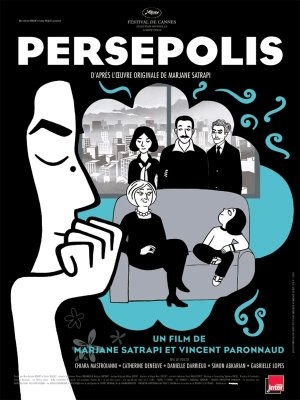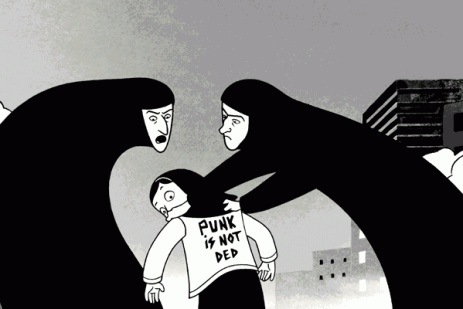 PERSEPOLIS (2007, directed by Vincent Paronnaud & Marjane Satrapi, 96 minutes, France)
PERSEPOLIS (2007, directed by Vincent Paronnaud & Marjane Satrapi, 96 minutes, France)
BY DAN BUSKIRK FILM CRITIC
The new animated film from France, Persepolis takes its name from the bygone capitol of what is now Iran. It’s a fitting title for this engrossing coming-of-age story, throwing its heroine into the tides of history with its story of a modern young woman searching for her place among an ancient culture. Animated in an uncluttered black and white style, Persepolis rescues what could be a sentimental, time-worn tale by presenting a complicated cross-cultural journey riddled with blasts of Western Pop adrenaline. Prepare to have any assumptions about demure Middle Eastern women shattered by the chest-thumping roar of Iron Maiden.
Co-director Marjane Satrapi has collaborated with animator Vincent Paronnaud to bring her series of autobiographical graphic novels to life. Starting at the fall of the Shah in 1979 and following Marjane (voiced by Chiara Mastroianni, daughter of icons Marcello Mastroianni and Catherine Deneuve) through the Islamic revolution and the Iran/Iraq war, Persepolis gives us a concise history of modern Iran while presenting an unusually moving and funny portrait of how one woman’s stubborn spirit survived repression and exile. We first meet Marjane as a seven year-old, swept up in the excitement of the dethroning of the Shah, who only too quickly finds out that her family’s royal lineage is as distasteful to the Islamic regime as it was to the government they deposed. Her radical uncle is given a brief reprieve between regimes before he is again sent to prison with a death sentence. Allowed only one visit before his execution, he chooses his young niece Marjane as the most important vessel to carry away his story. Persepolis is filled with such partings, their biographical veracity charging them with emotion and illustrating the price to be paid living in such tumultuous times.
It’s not all grim though. Marjane’s inherited a fierce individualism from her wise mother and grandmother, which she exhibits by daring to consume Western music, buying punk, metal and Bee Gees cassettes on the black market while clothed in her chador. The adrenalizing glee of tasting forbidden fruit — even if it is Iron fucking Maiden — is rendered palpable in a wonderfully ridiculous montage set to “Eye of the Tiger” from Rocky 3.
Maiden — is rendered palpable in a wonderfully ridiculous montage set to “Eye of the Tiger” from Rocky 3.
Taking advantage of the unique plasticity of animation, Persepolis enlivens its fact-based drama with sudden shifts to the surreal, whether it is Marjane’s fantasy of being a prophet or the whiplash contrasts between impoverished Iran and Marjane’s exile to prosperous Vienna. Sent there alone to live with an aunt at the age of fourteen, Marjane struggles to find her place among the frivolous lives of Western teens. Particularly well-observed is her brief membership among a group of wannabee punk anarchists, who can only feign the outcast angst which is Marjane’s birthright.
Persepolis follows Marjane through homelessness, an ill-advised marriage and her return to Iran, its soap opera machinations deepened by historical tensions that threaten the freedom of her and her family through every turn. I was reminded occasionally of The Simpsons and its unadorned animation style, which made me feel all the more sheepish when the story’s emotions crept up, leaving me weepy. Realizing it was the vocal presence of French grand dames Danielle Darrieux as the grandmother and Catherine Deneuve as Marjane’s mother contributing to my crying jag made me feel like less of a sucker. With its ambitious blend of animation, autobiography and history, Persepolis has become a bona-fide hit worldwide, all of which proves that despite the widening gulf between Islam and the West, it really is a small world after all.
